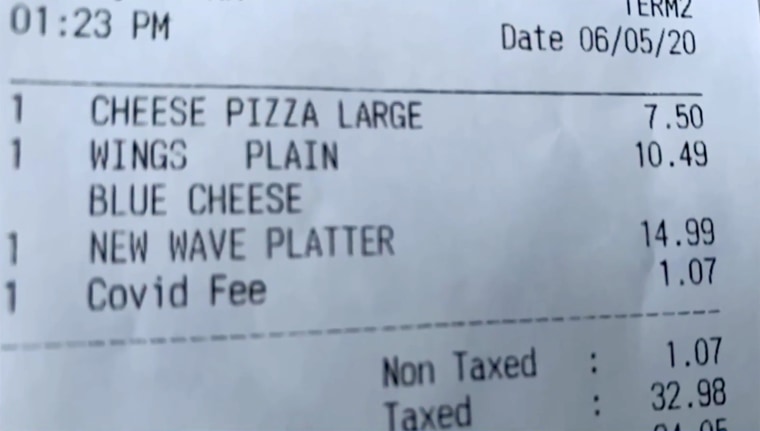From dentists to restaurants to waxing salons, a growing number of businesses are adding a "COVID surcharge" to their bill, passing along pandemic-induced costs to their customers. But who should really foot the bill for these fees?
While it's understood that business owners are facing increased costs due to social distancing requirements, additional sanitization, and protective equipment for staff — and consumers are to some extent sympathetic — their patience may wear thin as COVID costs continue to linger.
For many families, finances are already stretched to the limit after months of furloughs and shutdowns. Last week, 1.3 million people filed for unemployment for the first time — the 17th consecutive week the number has been above a million. There are also around 25 million out-of-work Americans set to lose their $600 government benefit at the end of the month, making it hard to find the extra money for COVID-related levies.
Lisa Bari, who works in healthcare policy in Baltimore, Maryland, balked when her dentist emailed to say there would be an additional $8 fee for personal protective equipment such as goggles and face shields. She argued that most insurance plans would already cover it, and that federal programs would cover loans for staff and supplies. In protest she changed practices, describing COVID as a “new fee opportunity.”
“I am fundamentally opposed to passing on short-term fees to patients,” Bari told NBC News. “I don’t believe the dentist will take back the fees once they’re added.” Bari recalled similar fees levied by the travel industry in the wake of September 11 that became permanent. “It didn’t add up to me.”
Not everyone is against such charges, though. Katie Capparelli, from Chicago, said the $15 fee levied by her dentist was justified, given the precautions put in place by the dental office. “I don’t mind if they’re spending it on disinfectant. It made me more comfortable going in, that they’re protecting me and their employees.”

According to a statement on its website, the American Dental Association said it encourages offices to “disclose additional fees upfront to patients and to document these charges in the patient record," and said dental benefit carriers should either, “adjust the maximum allowable fees for all procedures to cover the increased costs of PPE or allow an additional standard fee per date of service, per patient.”
Medical professionals aren’t the only ones passing along extra costs. Social media sites are flooded with photos of restaurant receipts containing COVID surcharges. In June, several Las Vegas restaurants, including the popular French restaurant Mon Ami Gabi, added a 4 percent fee with a note that diners could speak up if they wanted it removed.
The charges have since been dropped, and a spokesperson for the company declined comment. The restaurant's parent company told the Las Vegas Review-Journal that the fee was for rising food prices, the 50 percent occupancy limit, and new sanitation practices and personal protective equipment.
Supercuts hair salon included a “Sanitation Surcharge” of $3.95 for one customer's recent visit. When the customer posted the receipt to Twitter, the salon responded saying that delivering a safe salon commitment comes with additional costs.
Stephanie Fierman from East Hanover, New Jersey, said her regular hair and nail salons have raised their prices by 10 and 20 percent, respectively, explaining that it was due to additional “COVID handling” requirements.
“I don’t have a problem with these charges today, but am bothered by the idea that they may never be withdrawn," Fierman told NBC News, echoing consumer sentiment on temporary charges becoming permanent. "I wouldn’t want to see it become an excuse for raising prices.”
Even colleges are adding surcharges related to the pandemic. The University of Michigan is charging a $50 "COVID response fee" for each semester, which has outraged some students, especially given the recent 1.9 percent increase in tuition fees. Rick Fitzgerald, a spokesman at the University, said the fees would cover testing and other health- and safety-related services, noting that individual COVID tests are around $100 per person.
Of course, hidden fees are nothing new to consumers who have long complained about hotel resort fees, surprise rental car bill additions and cable bills.
Anna Laitin, director of financial fairness and legislative strategy at Consumer Reports, told NBC News that the organization is against hidden fees and said companies should be upfront about base costs.
However, Laitin did acknowledge that this time period is unique, saying, “There is a moment-in-time difference here, especially with small businesses that may make a difference. But no matter what, under all conditions, companies should be very transparent about these fees."
"The highest frustration from consumers is when they think they’re paying one price and they get all the way to the end and there’s a hidden fee they weren’t informed about and had no reason to know about,” Laitin said.